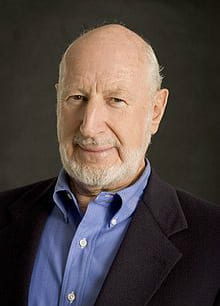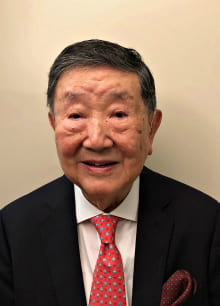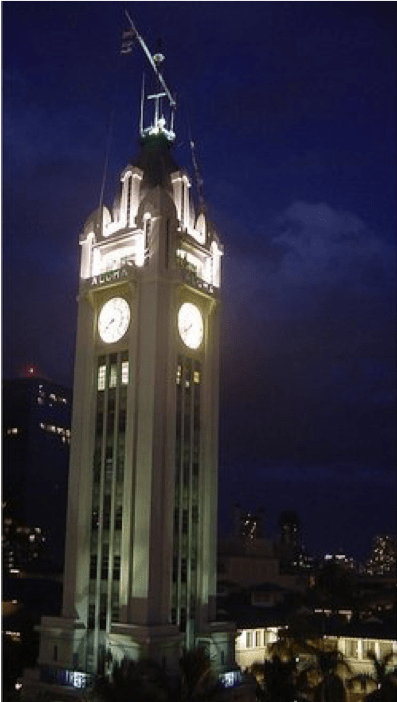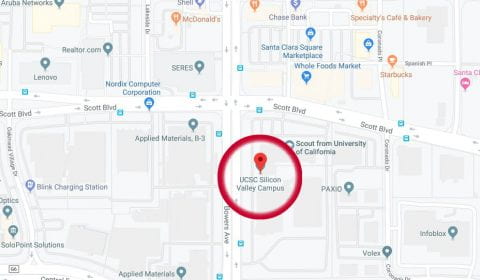
ABOUT SPEAKERS PROGRAM POSTER SUBMISSIONS VENUE

About the ALOHA System
Before the development of carrier sense multiple access (CSMA), CSMA with collision detection (CSMA/CD) used in Ethernet, CSMA with collision avoidance (CSMA/CA) used in WiFi and WiMAX, Wireless Internet of Things, and mobile ad-hoc networks (MANET), there was the simplest approach for the sharing of a multiple-access wireless link, the ALOHA channel, and the first project aimed at demonstrating packet switching over radio channels, the ALOHA system project.
In September 1968, the University of Hawaii (UH) began work on the ALOHA system project supported by the Advanced Research Projects Agency (ARPA) and the U.S. Air Force Office of Aerospace Research, and led by Norman Abramson and Franklin Kuo.

Norm Abramson

Frank Kuo
The essence of the ALOHA channel is to transmit at will – if the transmitter is unsuccessful then it will retransmit at some random time in the future. This simplicity, the elegance of the analytical model describing the behavior of the ALOHA channel, and the groundbreaking demonstration of a wireless packet-switching network based on it launched a revolution on packet switching over wireless links. The ongoing impact and influence of the ALOHA system project has been vast. The ALOHA channel and subsequent modifications are utilized in all major mobile networks and in almost all two-way satellite data networks. In a way, all mobile phones used today “say ALOHA” every time they are used, as the very first packet transmitted is sent via an ALOHA random access channel.
UC Santa Cruz is hosting a symposium on January 24th to celebrate the remarkable accomplishments of the ALOHA system, and to honor Norman Abramson and Franklin Kuo for their technical leadership. The symposium brings together the directors of the ALOHA system project, several of the original members of the development team, UH faculty and alumni, and several distinguished speakers addressing the impact and influence of the ALOHA channel and the ALOHA system over the years.
Program

Aloha Tower, Oahu, Hawaii
- J.J. Garcia-Luna-Aceves, CITRIS Campus Director, UCSC
- Alexander Wolf, Dean, Baskin School of Engineering, UCSC
- Brennon Morioka, Dean, College of Engineering, Univ. of Hawaii at Manoa
- Richard Binder
- Ram Chandran, AnaCom, Inc.
- Luigi Fratta, Politecnico di Milano
- Erol Gelenbe, Polish Academy of Sciences, and the University of Cote d’Azur
- Don Nielson, SRI International
- Fouad Tobagi, Stanford University
- James Freebersyser, Raytheon BBN Technologies
- Ian Akyildiz, Georgia Tech
- Stefano Basagni, Northeastern University
- Marcelo Carvalho, University of Brasilia
- Katia Obraczka, University of California, Santa Cruz
- Elizabeth Belding, University of California, Santa Barbara
- Monisha Ghosh, CTO, Federal Communications Commission
- Lt Col Dan “Animal” Javorsek, DARPA
- Kathyayani Srikanteswara, Intel
- Bishal Thapa, Raytheon BBN Technologies
Poster Submissions
Research posters will be an important component of the event, given that we only have room
for very few presentations by distinguished speakers and panelists. We are soliciting research
posters to be presented during the event. Topics of interest concern anything related to data
communication over untethered media, including (but not limited to) the following:
- Upcoming research challenges, future directions and works in progress
- Practical implementations, research testbeds and living labs
- Industrial and commercial developments
- Recent research/implementation results and prototypes
- Novel hardware and tools
- Real-world deployments and platforms for research
- Public-private and industrial-academic collaboration initiatives
Get the full submission guidelines and format HERE.
Venue and Hotels
Venue:
UCSC Silicon Valley Campus
3175 Bowers Avenue, Room 2110
Santa Clara, CA 95054
The UC Santa Cruz Silicon Valley Campus is a multi-disciplinary teaching and research hub that is home to a master’s degree program in Games and Playable Media, engineering faculty, SVLink incubator-accelerator program, the new office of Industry Alliances and Technology Commercialization, UCSC Silicon Valley Extension, UC Scout, and soon a great deal more.
Based in Santa Clara, the satellite campus is enabling greater partnerships and collaborations among faculty, students, industry, and government. UC Santa Cruz students are regularly interning at companies throughout the region, and the university’s alumni are an integral part of the highly trained Silicon Valley workforce.
Nearby hotels:
Biltmore Hotel & Suites: negotiated rates for event attendees: Thursday night – $149; Friday night – $109
Directions: Click on the link provided below. Attendees/Guests will be directed to the UCSC reservation page. Click on “Select & Go to the Next Step” to start the reservation process. Select the arrival and departure date and confirm dates of stay. Select a room type, and click on “Book.” Once you have selected to “Book” you will be brought to the guest information page where you will enter your information and method of payment. This should complete and confirm you reservation.
Link: http://bookings.ihotelier.com/bookings.jsp?groupID=2707177&hotelID=13370
*To make reservation via phone, please call the hotel directly at (408) 988-8411 and mention the Booking ID #37786 to get the special group rate.

